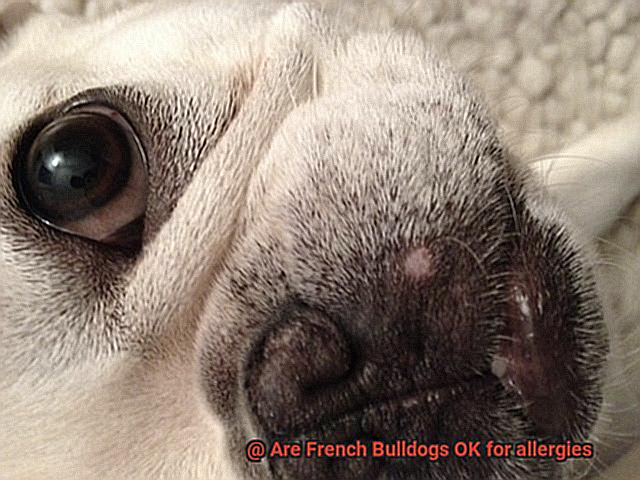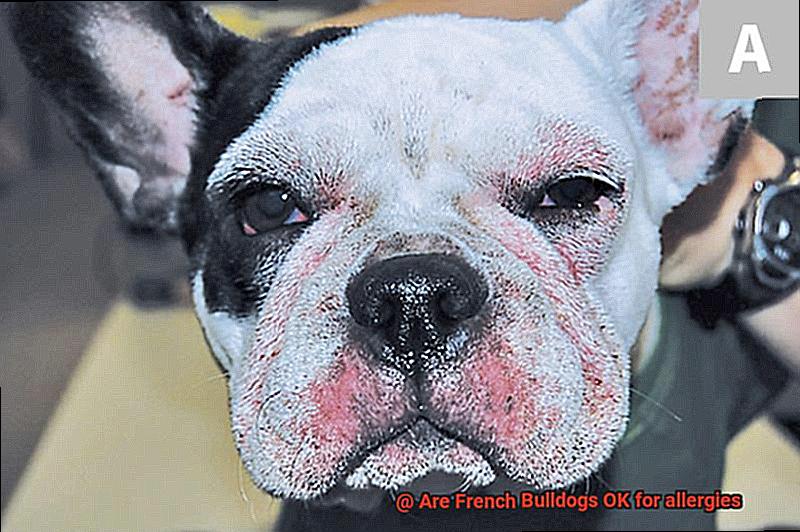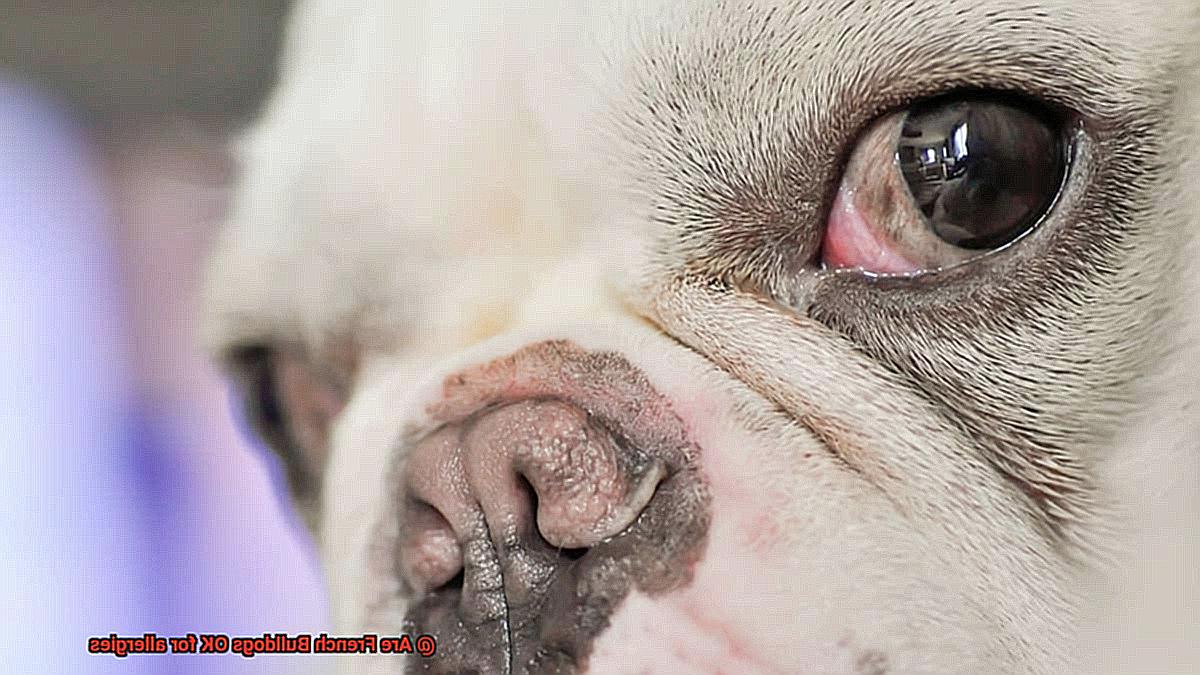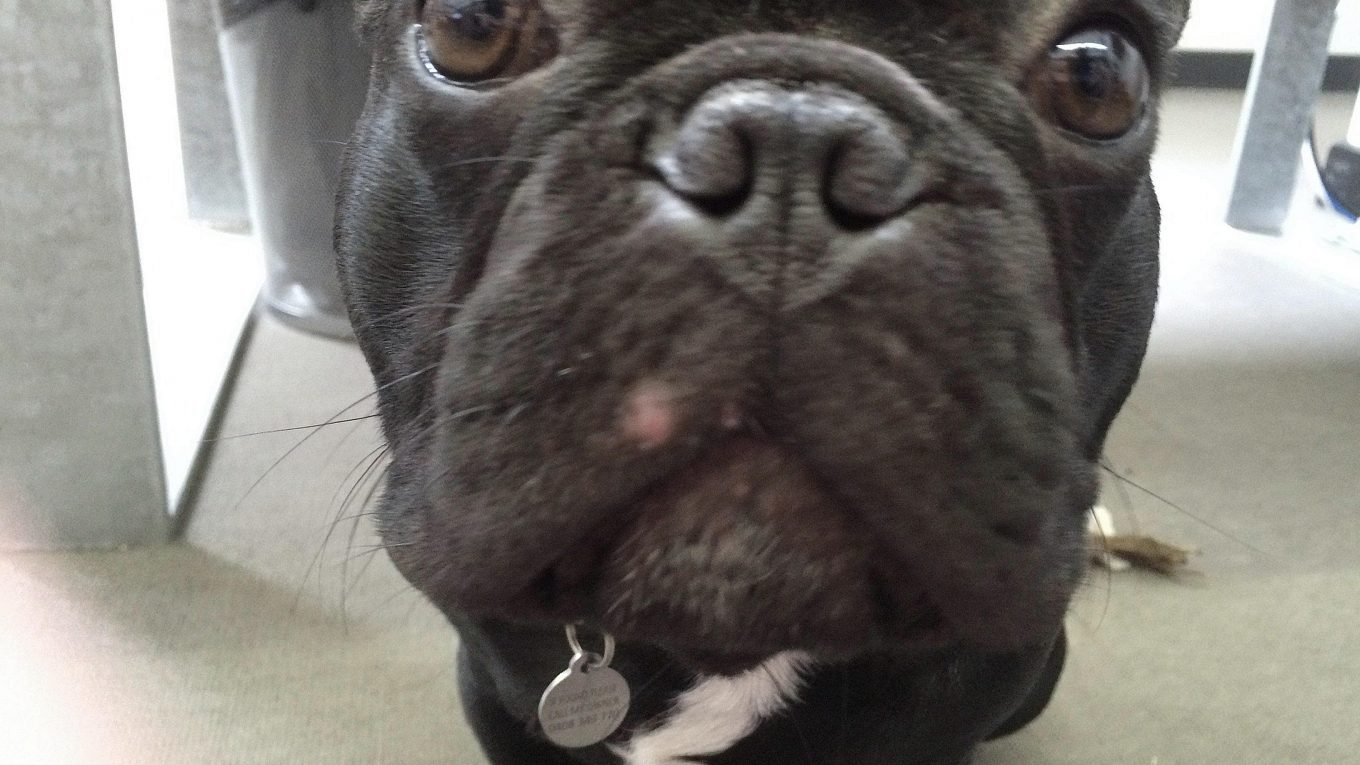Are French Bulldogs OK for allergies?
Love dogs but hate allergies? If you’re on the hunt for a furry friend that won’t send your sinuses into overdrive, you’ve probably wondered if French Bulldogs fit the bill. With their adorable bat-like ears and snuggly personalities, these little cuties have become all the rage. But are they really hypoallergenic? Let’s dig deep into the truth behind the claims and give you the lowdown on whether French Bulldogs are a good match for allergy sufferers. From mild sniffles to full-on sneezefests, we’ll explore all the factors that determine if these pups are truly okay for allergies or not.
The Hypoallergenic Nature of French Bulldogs
Contents
- 1 The Hypoallergenic Nature of French Bulldogs
- 2 What Causes Allergic Reactions in Dogs?
- 3 How to Test for Allergies with French Bulldogs
- 4 Grooming and Cleaning Tips for French Bulldog Owners
- 5 The Possibility of Allergic Symptoms Despite a Hypoallergenic Breed
- 6 Consulting an Allergist for Further Solutions
- 7 Understanding the Variability of Allergic Reactions
- 8 Taking Necessary Precautions to Ensure Comfort
- 9 Conclusion
French Bulldogs are often celebrated as a hypoallergenic breed, making them an attractive choice for individuals with allergies. However, it is important to understand that no dog breed is completely allergen-free.
Here, we will explore the hypoallergenic nature of French Bulldogs and debunk some common misconceptions surrounding their allergenic properties.
Shedding and Allergens:
French Bulldogs have a short and smooth coat, which leads many to believe that they shed less and produce fewer allergens. While they do shed less compared to longer-haired breeds, they still shed to some extent. This shedding can release allergens into the environment, potentially causing allergic reactions in susceptible individuals.
Dander Production:
Dander, tiny flakes of dead skin, is a common allergen for many people. French Bulldogs produce less dander compared to some other breeds, making them a better choice for individuals with allergies. However, it is crucial to note that dander production can still occur, albeit in reduced amounts.
Drooling Tendencies:
Excessive drooling can also contribute to the spread of allergens and trigger allergic reactions in some people. Fortunately, French Bulldogs have a lower tendency to drool compared to other breeds. This reduced drooling helps minimize allergen exposure for allergy sufferers.
Individual Reactions:
It is important to understand that individual reactions to allergens can vary greatly. Even with a hypoallergenic breed like the French Bulldog, some individuals with allergies may still experience symptoms. Therefore, it is recommended for allergy sufferers to spend time with a French Bulldog before bringing one into their home to gauge their reaction.
Grooming and Cleaning Practices:
Regular grooming and cleaning practices play a vital role in reducing allergens in the environment. Brushing your French Bulldog’s coat regularly helps remove loose hair and dander, thereby minimizing the amount of allergens in the air. Additionally, frequent vacuuming and cleaning surfaces can help eliminate allergens from your home.
Conclusion:
While French Bulldogs are often considered hypoallergenic due to their short coat, low dander production, and reduced drooling tendencies, it is essential to remember that no breed is completely allergen-free.
The hypoallergenic nature of French Bulldogs makes them a suitable choice for individuals with allergies, but individual reactions can still occur. By spending time with a French Bulldog beforehand and implementing proper grooming and cleaning practices, you can create a comfortable living environment for both you and your furry friend.
Remember to consult with an allergist if necessary and always prioritize the well-being of both yourself and your pet.
What Causes Allergic Reactions in Dogs?
French Bulldogs are adorable and lovable companions, but even these superhero-like pups can be prone to allergic reactions. In this blog post, we will explore the various factors that can trigger allergies in French Bulldogs, shedding light on why these furry friends may suffer from itchy skin, sneezing fits, and gastrointestinal issues. So, let’s dive right into the causes of allergic reactions in French Bulldogs.
Environmental Allergens:
French Bulldogs can be sensitive to common environmental allergens such as pollen, dust mites, and mold spores. These microscopic irritants can be found both indoors and outdoors, causing your Frenchie’s immune system to go into overdrive.
Food Allergies:
Just like humans, dogs can have food allergies too. French Bulldogs may develop allergies to certain ingredients, including beef, chicken, dairy, wheat, and soy. These dietary triggers can lead to skin rashes, ear infections, and digestive problems.
Flea Allergy Dermatitis (FAD):
Fleas are not only annoying for our furry friends but can also cause severe allergic reactions. French Bulldogs are no exception. A single flea bite can trigger an intense allergic response known as Flea Allergy Dermatitis (FAD), resulting in excessive itching, hair loss, and irritated skin.
Contact Allergies:
French Bulldogs can also have contact allergies to certain chemicals or substances. Common culprits include cleaning products, perfumes, and specific fabrics. These allergens come into direct contact with your Frenchie’s skin and may cause redness, swelling, or hives.

Insights from First-hand Knowledge:
As a proud owner of a French Bulldog named Bella, I have witnessed her struggle with allergies firsthand. Bella’s most significant allergy trigger is pollen during the spring season. To manage her allergies effectively, we keep her indoors during peak pollen times and regularly wipe her paws and coat after outdoor walks.
Conclusion:
Understanding the causes of allergic reactions in French Bulldogs is crucial for providing them with the care they deserve. Environmental allergens, food allergies, flea bites, and contact with certain substances are all potential triggers for these adorable pups. By identifying and managing these allergies, you can ensure a happy and healthy life for your French Bulldog companion.
How to Test for Allergies with French Bulldogs
In this guide, we’ll explore how to test for allergies in French Bulldogs, so you can make an informed decision and have a happy, sniffle-free life with your new pet.
The Scoop on Allergies:
French Bulldogs may seem like a good choice for allergy sufferers because of their short coats and minimal shedding. But allergies can still be a concern. Allergies are caused by a reaction to allergens, which are substances that trigger an immune response in sensitive individuals.
Common Culprits:
Dogs can have allergens like dander (dead skin cells), saliva, and urine. These allergens can cause itching, sneezing, watery eyes, and even upset tummies. That’s why it’s important to test for allergies before bringing a French Bulldog home.
Testing Methods:
There are different ways to test for allergies. One method is a skin prick test. It involves tiny pricks or scratches on the dog’s skin to introduce small amounts of allergens. The vet will then watch for any allergic reactions.
Blood Tests:
Another way to test is through blood tests. These tests measure the levels of specific antibodies in the dog’s blood that are linked to allergies. This helps identify the specific allergens causing the reaction.
Elimination Diets:
Sometimes, food allergies can make our furry friends feel itchy or sick. To check for food allergies, vets may recommend elimination diet trials. It involves feeding your French Bulldog a special diet that removes potential allergens and slowly reintroducing them to see if any reactions occur.

Seek Expert Advice:
Always consult with an allergist or veterinarian who specializes in allergies. They can guide you on the best testing method and provide helpful advice on managing allergies if your French Bulldog is allergic to certain things.
Grooming and Cleaning Tips for French Bulldog Owners
Grooming and cleaning are essential aspects of owning a French Bulldog, especially if you or someone in your household has allergies. While French Bulldogs are generally considered hypoallergenic, meaning they produce fewer allergens, it is still crucial to maintain a regular grooming routine to minimize the risk of allergic reactions. Here are some grooming and cleaning tips for French Bulldog owners:

Brushing
Regular brushing helps remove loose hair and dander from your French Bulldog’s coat, reducing the amount of allergens in your home. Use a soft-bristle brush or a grooming mitt to gently brush your Frenchie’s fur. Be sure to pay attention to areas prone to matting, such as behind the ears and under the legs.
Bathing
Bathing your French Bulldog every 4-6 weeks can help keep their skin clean and reduce allergens. Use a hypoallergenic shampoo that is specifically formulated for dogs, as human shampoos can irritate their sensitive skin. Be sure to rinse thoroughly to remove all traces of the shampoo.
Ear Cleaning
French Bulldogs are prone to ear infections due to their floppy ears and narrow ear canals. Regularly clean your Frenchie’s ears with a veterinarian-recommended ear cleaner to prevent wax buildup and infection. Gently wipe the outer ear with a cotton ball or soft cloth, avoiding inserting anything into the ear canal.
Dental Care
Poor oral hygiene can contribute to bad breath and gum disease, which can worsen allergies in sensitive individuals. Brush your French Bulldog’s teeth regularly using a dog-friendly toothpaste and toothbrush. Additionally, provide dental chews or toys that help remove plaque and tartar buildup.
Paw Care
Your French Bulldog’s paws can track allergens into your home, so it’s important to keep them clean. After walks or outdoor playtime, wipe your Frenchie’s paws with a damp cloth to remove any potential allergens, dirt, or chemicals they may have come into contact with.
Vacuuming and Cleaning
Regularly vacuum your home, paying close attention to areas where your French Bulldog spends the most time. Use a vacuum cleaner with a HEPA filter to trap allergens effectively. Additionally, wash your Frenchie’s bedding, blankets, and toys frequently using hypoallergenic laundry detergent to eliminate allergens.
The Possibility of Allergic Symptoms Despite a Hypoallergenic Breed
Owning a hypoallergenic breed like the French Bulldog can be a dream come true for individuals with allergies. These lovable companions are known for their low-shedding coats and minimal dander production. However, it is essential to recognize that no breed can guarantee complete immunity from allergens. In this article, we will explore why individuals may still experience allergic symptoms despite owning a hypoallergenic breed like the French Bulldog.
Understanding Allergies to Dogs:

Allergic reactions to dogs are primarily caused by proteins found in their saliva, urine, and dander (dead skin cells). These proteins can easily become airborne and can be inhaled or come into contact with the skin, leading to allergic symptoms. While French Bulldogs have short hair and minimal shedding compared to other breeds, they still produce dander that contains allergenic proteins.
Factors Contributing to Allergic Symptoms:
- Dander Accumulation: French Bulldogs may produce less dander than other breeds, but it can still accumulate on furniture, carpets, and clothing, making it difficult to completely avoid exposure.
- Environmental Allergies: French Bulldogs, like any other breed, are prone to environmental allergies. These allergies can be triggered by pollen, dust mites, mold spores, or certain chemicals present in the surroundings.
- Breed-Specific Allergens: While relatively rare, some individuals may be specifically allergic to certain proteins found in the French Bulldog breed. These allergies can cause discomfort for the dog owner.
Managing Allergic Symptoms:
To minimize the risk of allergic symptoms despite owning a hypoallergenic breed like the French Bulldog, here are some helpful measures:
- Regular Grooming: Regular grooming and bathing of your French Bulldog can help reduce allergen levels in their fur and dander.
- HEPA Filters: Using high-efficiency particulate air (HEPA) filters in your home can help remove allergens from the air, providing a cleaner environment for allergy sufferers.
- Clean Home Environment: Keeping your home clean and free of dust and pet dander can also help minimize exposure to allergens.
Assessing Individual Sensitivity:
It is vital for individuals with known allergies to dogs to spend time with a French Bulldog before bringing one into their home. This “trial period” can help determine if they will be able to tolerate the breed without experiencing severe allergic symptoms.
Considering Alternatives:
In cases where individuals have moderate to severe allergies, it may be necessary to explore other options. This could include considering a different hypoallergenic breed or opting for a non-shedding pet like a fish or reptile instead.
Consulting an Allergist for Further Solutions
Many people with allergies have successfully managed their symptoms while owning these adorable pups. One crucial step in finding further solutions is consulting an allergist – a medical professional who specializes in diagnosing and treating allergies. Let’s dive into why this consultation is essential for managing allergies and enjoying the company of your Frenchie.
Accurate Diagnosis:
An allergist can help determine whether your allergies are triggered by French Bulldogs or other factors. Through allergy tests like skin pricks or blood tests, they identify the specific allergens causing your reactions. This accurate diagnosis allows for targeted treatment and management plans.
Tailored Treatment:
Your allergist can recommend medications, such as antihistamines or nasal sprays, to alleviate allergic reactions. They may also suggest immunotherapy (allergy shots) as a long-term treatment option. However, it’s crucial to discuss the effectiveness of immunotherapy for pet allergies with your allergist.
Minimizing Exposure:
In addition to medical interventions, allergists provide advice on reducing exposure to allergens. They can guide you in creating an allergen-free environment at home by using air purifiers, regular cleaning, and keeping your Frenchie out of certain areas like bedrooms.
Debunking Hypoallergenic Myths:
Have you heard about hypoallergenic breeds? While no dog is completely hypoallergenic, certain breeds like French Bulldogs may produce fewer allergenic proteins, making them more suitable for some individuals. However, it’s essential to understand that individual sensitivities vary.
Personalized Solutions:
Consulting an allergist allows you to receive personalized advice tailored to your specific allergies and circumstances. They can provide comprehensive information about managing allergies while owning a French Bulldog, empowering you to make informed decisions about pet ownership.
Understanding the Variability of Allergic Reactions
If you’re considering getting a French Bulldog but have allergies, it’s essential to understand the variability of allergic reactions. Allergies can manifest differently from person to person, even when exposed to the same allergen. Here are some factors that contribute to this variability:
- Individual’s Immune System: Your immune system plays a significant role in how your body reacts to allergens. Some people may have a more sensitive immune response, leading to more severe allergic reactions, while others may have milder symptoms.
- Genetic Predisposition: Genetics can also influence your susceptibility to allergies. If you have a family history of allergies or asthma, you may be more likely to develop allergic reactions to certain triggers, including pet dander or saliva.
- Amount and Duration of Exposure: The severity of allergic reactions can depend on how much and how long you are exposed to the allergen. For example, spending prolonged periods in close proximity to your French Bulldog may increase your chances of experiencing symptoms.
It’s important to note that not all individuals with allergies will react to French Bulldogs or any other specific breed. Some people may be more sensitive to certain breeds, while others may not experience any allergic symptoms at all. If you’re unsure about your potential reaction to French Bulldogs, consult with your healthcare provider or allergist before making a decision.
Managing allergies when owning a French Bulldog is possible with the right strategies:
- Regular Grooming and Bathing: Frequent grooming and bathing of your French Bulldog can help minimize allergens like pet dander on their fur.
- Clean Living Environment: Keeping your living space clean and free from allergens is crucial. Vacuum regularly, wash bedding frequently, and consider using air purifiers or filters.
- Medications and Allergy Shots: Your healthcare provider may prescribe medications such as antihistamines or recommend allergy shots to help manage your symptoms.
Taking Necessary Precautions to Ensure Comfort
While it may seem challenging, with the right precautions, you can create a comfortable environment for both you and your furry friend. In this blog post, we will discuss the necessary steps you can take to ensure comfort and minimize allergen exposure.
Keep Your Living Environment Clean:
- Regularly vacuum floors and furniture to remove pet dander and pollen.
- Dust and wipe surfaces to eliminate potential allergens.
- Use a HEPA filter in your vacuum cleaner to capture even the tiniest particles.
Designate a Specific Area for Your French Bulldog:
- Create a designated area or room where your French Bulldog spends most of its time.
- Keep this area clean and well-ventilated.
- Regularly air out the space to prevent the accumulation of allergens.
Regular Grooming:
- Brush your French Bulldog’s coat frequently to reduce shedding and dander.
- Use hypoallergenic grooming products designed for sensitive individuals.
- Bathe your Frenchie regularly using gentle shampoos to remove allergens from their skin and hair.
Choose Hypoallergenic Bedding Materials:
- Opt for hypoallergenic materials for your French Bulldog’s bed.
- Wash the bedding regularly to maintain cleanliness.
- Use washable covers for furniture and pillows to reduce allergen exposure.
Invest in an Air Purifier:
- Purchase an air purifier with a HEPA filter to improve indoor air quality.
- Place the purifier in the room where your French Bulldog spends most of its time.
- Keep windows closed during high pollen seasons.
Regular Veterinary Visits:
- Consult with your vet about any concerns regarding allergies.
- Discuss specific measures you can take to alleviate symptoms.
- Consider dietary changes or prescribed medication if necessary.
Maintain Good Personal Hygiene:
- Wash your hands thoroughly after handling your French Bulldog.
- Avoid touching sensitive areas, such as your face or eyes, before washing your hands.
rkBoMhDG4hI” >
Conclusion
In conclusion, French Bulldogs can be a suitable choice for individuals with allergies.
These adorable canines have a short and smooth coat that produces less dander, which is a common trigger for allergies. Additionally, their minimal shedding helps to minimize the amount of allergens in the environment.
It is advisable to spend time with French Bulldogs before making a decision to ensure compatibility with your specific allergy needs.




